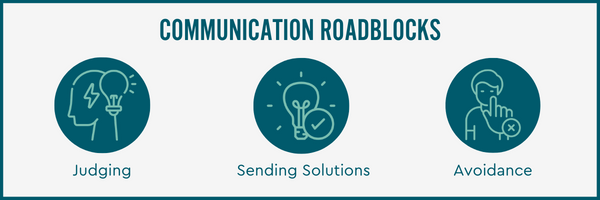
Three communication roadblocks (and how to ditch them)
By Carolyn Quainton in Behaviour, Communication, Consultancy, Employee engagement, Inspiration
Did you know that communication barriers can harm your relationships with friends, family and work colleagues?
Relationship building relies heavily on communication, so you risk missing out on some significant chances to connect if you’re unaware of the dynamics at play.
In fact, over 50 per cent of people say that communication breakdowns have led to stress. Another 31 per cent say that low morale was the result of poor communication at work. Understanding these obstacles can mean the difference between a successful and unsuccessful relationship.
What gets in the way of good communication?
None of us would get anywhere without some good communication; it’s the lifeblood of any relationship. But many of us fall into bad habits and traps that prevent us from being able to truly understand – and connect with – others.
The first step, is to correct these poor conversational habits we’ve picked up through the years. These habits can be broken down into three main categories, which are:

Judging – Everyone comes into any conversation with pre-set biases, which can come across as ‘judging’ in one way or another. These judgements can range from criticism, name-calling, diagnosing, and ‘positive’ evaluations. Any of these could make the other person defensive during a conversation. While the first three behaviours could elicit an automatic negative response, positive evaluations (compliments, flattery etc.) can also hinder communication. You may make the other person wonder what you’re up to, rather than having your message heard.
Sending Solutions – This is when one person immediately offers solutions to a dilemma. These include ordering, threatening, moralising, excessively questioning, and advising. Even though you might think you’re being helpful, it’s possible that the other person needs to have their experience acknowledged. By giving them answers right away, you’re not only telling them to move on, but also implying that they lack the maturity and intelligence to come to the correct conclusions on their own.
Avoidance – Avoiding the other person’s concerns is the final category of a communication breakdown. Redirecting or avoiding someone’s concerns can be invalidating. And it makes it less likely that the other person will reach out to you again in the future.
So what can you do to be a better communicator?
While conversational roadblocks aren’t always negative, most of us tend to overuse them. If you really want to connect better with others, stay clear of these obstacles – and form better habits instead. Habits like reflective listening and assertiveness.
Or speak to us about how programmes such as the Big Five can help your team communicate and work together more effectively for a happier, more productive workplace.
Check out our next blog where we will cover these specific strategies which will help you to become a better communicator.
Talk to us, explore our website, read our blog, and follow us on LinkedIn to learn more and discover ways to grow a more successful business.


